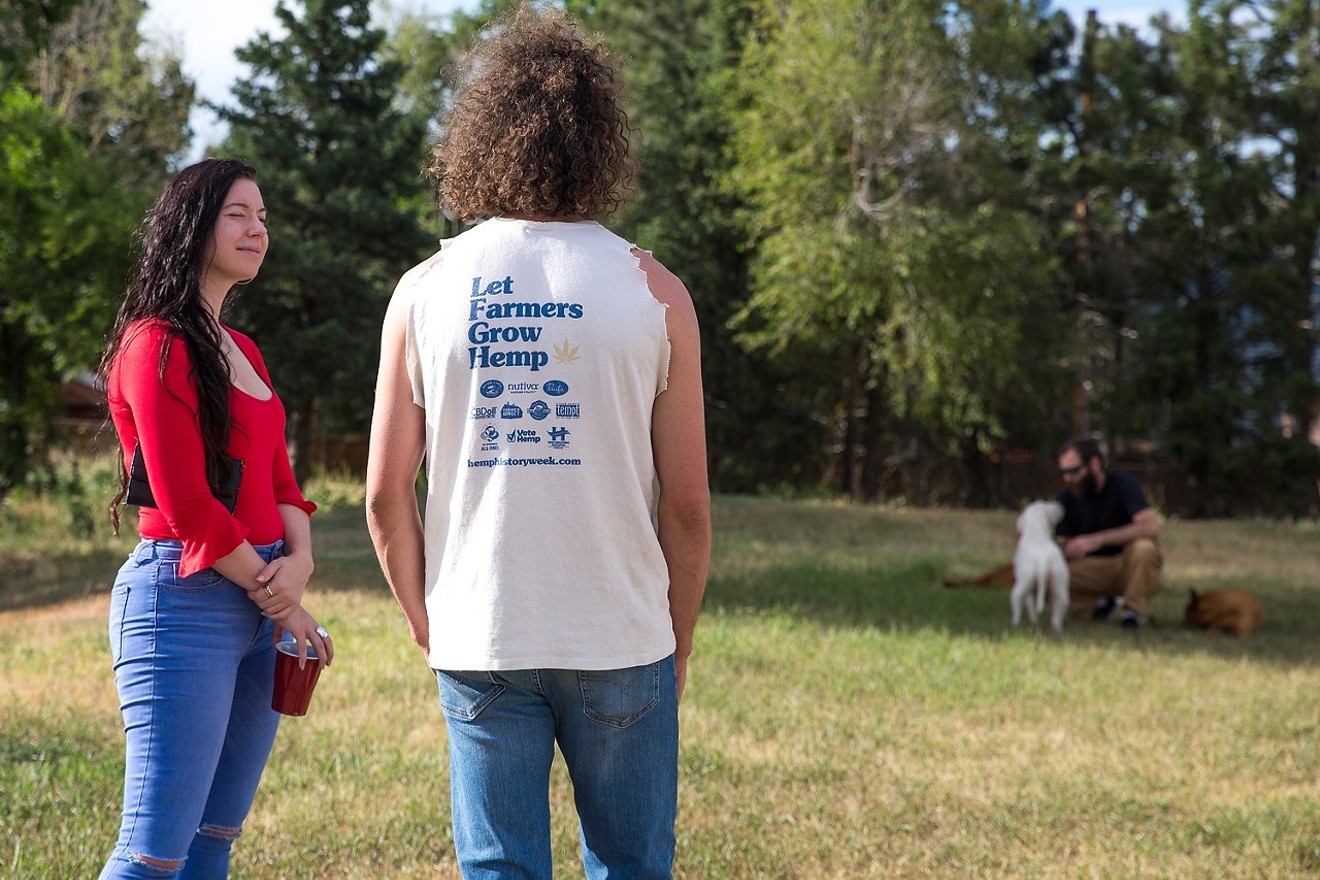Colorado voters could approve a measure this November that will take industrial hemp out of the Colorado Constitution. Many hemp-industry members and growers say it's a necessary move to keep the state competitive.
Many, but not all.
Colorado made history in 2012 when the state's voters approved marijuana legalization with the passage of Amendment 64. This November, they'll vote on Amendment X, a proposal that would take the definition of industrial hemp out of the Colorado Constitution. Currently, the constitution defines hemp as a marijuana plant containing no more than 0.3 percent THC; anything over that threshold is considered marijuana by the State of Colorado. So if the federal government explicitly legalized industrial hemp and allowed it to contain 1 percent THC, Colorado would be stuck in the mud, according to Tetra Public Affairs founder Samantha Walsh.
"[Passing] this gives the legislature flexibility to adapt to whatever federal definitions come," explains Walsh, who represents clients in the hemp and marijuana industries through Tetra and serves on the board of the Colorado Hemp Industries Association. "If they were to ever increase the THC amount to 1 percent at the federal level, Colorado would be constrained."
The federal government's current definition of industrial hemp also carries the 0.3 percent limit; states allowing hemp farming all use the same number. But as Congress continues to negotiate details of the 2018 Farm Bill, some proponents are pushing for the federal bill to include language that not only legalizes hemp nationwide, but also raises the THC maximum to 1 percent.
There's an urgency to passing Amendment X, Walsh says, because it's increasingly difficult to amend the state constitution thanks to Amendment 71, the controversial "Raise the Bar" amendment that passed in 2016. "It's so difficult to change our constitution. No matter what, we would be putting ourselves behind the eight-ball if this doesn't pass," she adds.
However, not everyone who grows hemp supports that move. Matt Kahl, a marijuana and veterans-rights activist and Colorado Department of Agriculture-certified hemp breeder, doesn't like the idea of removing hemp from the constitution. His fears of leaving state hemp protections in the hands of congressional decisions and the Colorado Legislature outweigh any possible gains, he says, and he's not optimistic about the federal government raising THC's threshold.
"I understand that there's probably a lot of people in the industry who are supporters — farmers, even. The problem with that is they're not taking the long view. They want what they want, and they want it now," he says. "The bigger issue is that if they take the definition out of the constitution entirely, [the legislature] can make the definition whatever they want."
Kahl worries that letting the feds lead the way in hemp policy could set Colorado back even further; he's concerned about everything from new faces in the legislature who don't like hemp to big agro businesses pushing out the little guys.
"I honestly still don't think the legislature would defy the federal government [if the Farm Bill fails]," Kahl adds. "Amendment 64 was done in the face of the federal government, and it was done for Coloradans, by Coloradans. Let's say Amendment X passes: What happens if Monsanto develops a genetically modified hemp plant that completely disables the THC gene, and carries 0.0 percent THC? If they choose to lobby our legislature for the reduction of the statutory definition all the way down to 0.0, that would completely eliminate all regular citizens and programs from developing hemp. You'd have to buy seeds from one of those agricultural giants."
Walsh understands the fears that come with removing hemp's constitutional protection, but believes there's so much potential for gain that it's worth trusting Colorado lawmakers. "I can understand someone's fear that we're removing something from the constitution, but the Colorado Constitution is getting harder and harder to amend," she says. "We've had an amazing legislature that have been champions of this industry, so I don't think anyone would try to pull something like that."
Amendment X was put on the November ballot by a majority of Colorado lawmakers; only five voted against adding it to the ballot.
Still, Kahl wonders why the amendment doesn't just raise Colorado's limit to 1 percent if that's what the industry desires. "Whatever the lawmakers claim to want: Some say 1 percent, some say 2 percent. If that's what they want, then they should've put forth an amendment that says 1 percent or 2 percent," he concludes. "I'd be all for that."
[
{
"name": "Air - MediumRectangle - Inline Content - Mobile Display Size",
"component": "12017618",
"insertPoint": "2",
"requiredCountToDisplay": "2"
},{
"name": "Editor Picks",
"component": "17242653",
"insertPoint": "4",
"requiredCountToDisplay": "1"
},{
"name": "Inline Links",
"component": "18838239",
"insertPoint": "8th",
"startingPoint": 8,
"requiredCountToDisplay": "7",
"maxInsertions": 25
},{
"name": "Air - MediumRectangle - Combo - Inline Content",
"component": "17261320",
"insertPoint": "8th",
"startingPoint": 8,
"requiredCountToDisplay": "7",
"maxInsertions": 25
},{
"name": "Inline Links",
"component": "18838239",
"insertPoint": "8th",
"startingPoint": 12,
"requiredCountToDisplay": "11",
"maxInsertions": 25
},{
"name": "Air - Leaderboard Tower - Combo - Inline Content",
"component": "17261321",
"insertPoint": "8th",
"startingPoint": 12,
"requiredCountToDisplay": "11",
"maxInsertions": 25
}
]












